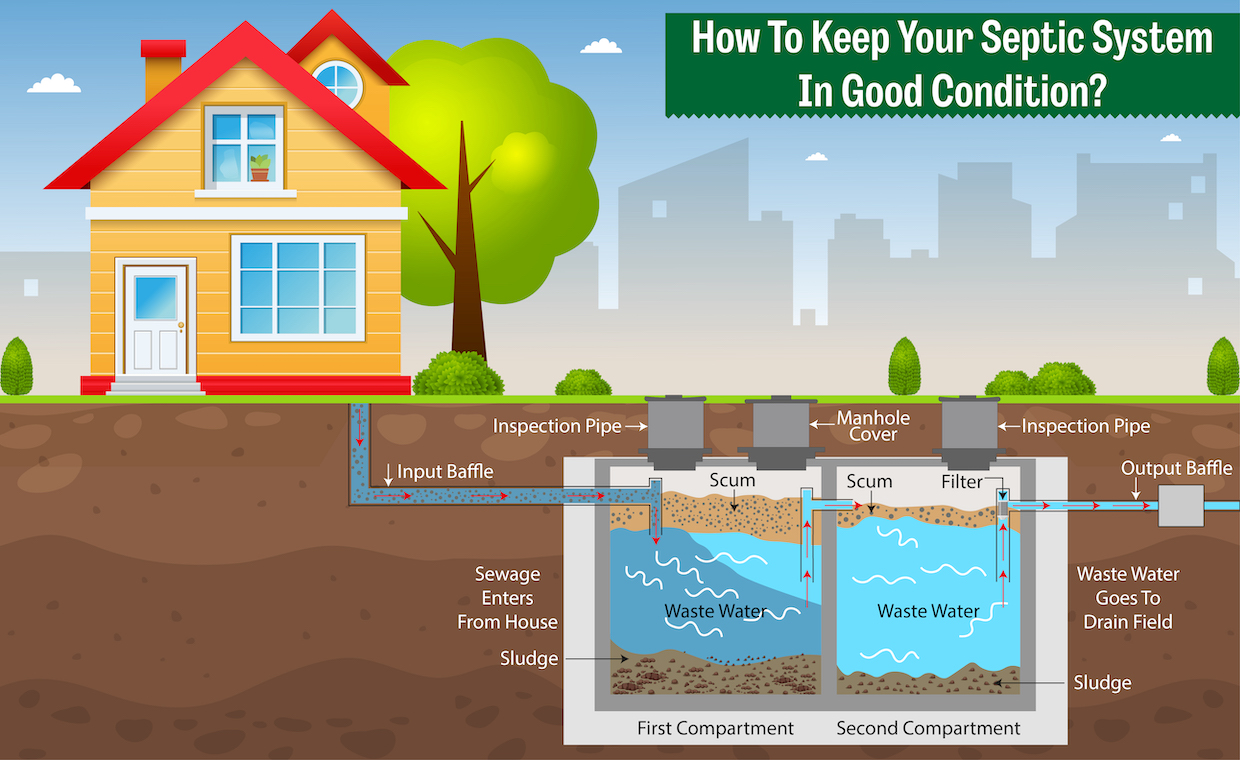In this article, we will discuss how often your septic tank should be cleaned and provide you with essential maintenance guidelines. Maintaining your septic tank is crucial for its efficient functioning and to avoid costly repairs in the future. We will explore factors that affect the cleaning frequency and provide you with expert advice on how to keep your septic system in top shape. By the end of this article, you will have a clear understanding of when and how to clean your septic tank and ensure its longevity.
Understanding Your Septic Tank
A septic tank is an essential component of a residential wastewater treatment system. It is an underground structure that collects and treats the wastewater from your household before it is naturally filtered back into the ground. Understanding how a septic tank works is crucial in order to properly maintain it and prevent any potential issues in the future.
What is a septic tank?
A septic tank is a watertight container made from materials such as concrete, fiberglass, or plastic. It is buried underground, typically in the backyard of a property. The primary function of a septic tank is to separate solid waste from the wastewater that flows into it. This separation allows the solids to settle at the bottom of the tank and form a layer of sludge, while the liquid (or effluent) is discharged into the drainfield for further treatment.
How does a septic tank work?
When wastewater enters the septic tank, it undergoes a series of treatment processes. The solids are broken down by naturally occurring bacteria, creating a layer of sludge at the bottom of the tank. The effluent, which is less dense than the sludge, floats towards the top of the tank. A baffle or filter prevents the scum (consisting of oils and grease) from leaving the tank and entering the drainfield.
The effluent then flows out of the septic tank and into the drainfield, where it is further treated by the soil. The soil acts as a natural filter, removing any remaining impurities before the water is safely returned to the groundwater table. This overall process is known as the septic system.
Importance of Regular Maintenance
Regular maintenance of your septic tank is crucial to ensure its proper functioning and prevent any potential problems. Neglecting septic tank maintenance can lead to costly repairs and even pose health risks to you and your family. Here are some reasons why regular maintenance is important:
Why is regular maintenance important?
-
Prevents system failure: Regular maintenance helps prevent your septic tank from becoming overloaded with sludge. If the sludge builds up excessively, it can clog the drainfield pipes and cause system failure. This can result in wastewater backing up into your home, creating a messy and unhygienic situation.
-
Extends the lifespan of the system: By properly maintaining your septic tank, you can significantly extend its lifespan. Regular pumping and inspection help identify any potential issues early on, allowing for timely repairs or adjustments. This can save you from the hassle and expense of replacing the entire system prematurely.
-
Protects the environment: A malfunctioning septic system can release untreated wastewater into the environment, contaminating nearby water sources and posing a threat to public health. Regular maintenance ensures that your septic tank is functioning properly, minimizing the risk of pollution and maintaining a healthy environment.
Benefits of regular maintenance
-
Cost savings: Investing in regular maintenance can save you money in the long run. By identifying and addressing issues early on, you can avoid costly repairs or system replacements. Regular maintenance also helps ensure that your septic system is operating efficiently, reducing water consumption and lowering your utility bills.
-
Peace of mind: Knowing that your septic system is in good working condition provides peace of mind. You can enjoy a worry-free experience, knowing that your wastewater is being properly treated and that you are doing your part to protect the environment.
-
Compliance with regulations: Many jurisdictions have regulations in place regarding septic system maintenance. Regular maintenance helps ensure that you are in compliance with these regulations, avoiding any potential fines or penalties.
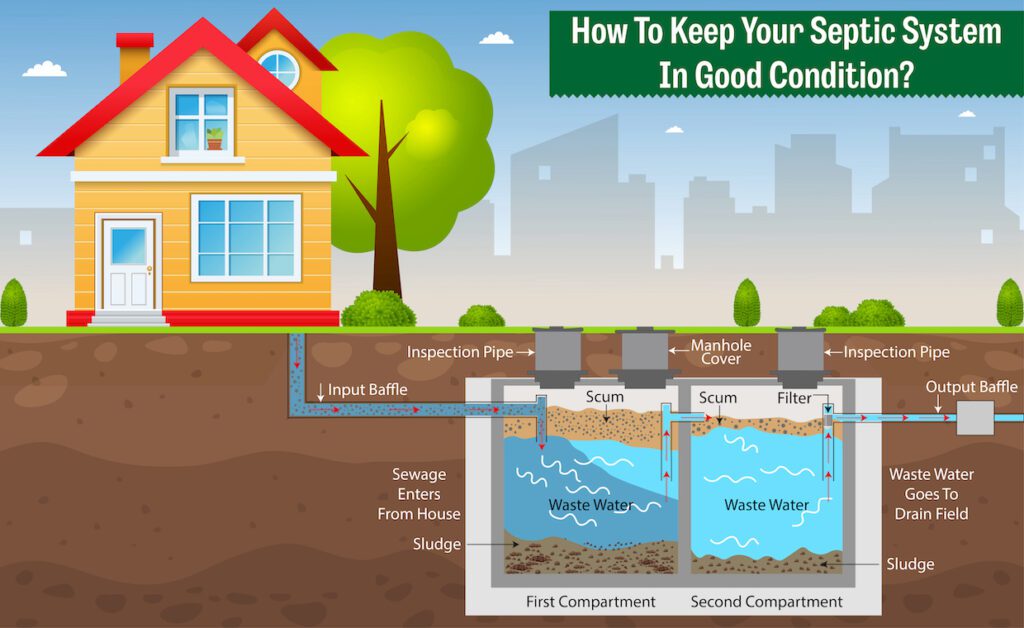
Factors That Affect Cleaning Frequency
The frequency at which your septic tank needs to be cleaned depends on various factors. Understanding these factors can help you determine the appropriate cleaning schedule for your specific situation. The two main factors that affect cleaning frequency are:
Number of occupants in the household
The more people living in your household, the more wastewater is generated. As a result, a septic tank serving a larger household will fill up more quickly and require more frequent cleaning. On average, a 1,000-gallon septic tank serving 2-3 people should be cleaned every 3-5 years. However, for households with more occupants, the frequency may need to be increased to every 2-3 years.
Tank size and capacity
The size and capacity of your septic tank also play a significant role in determining the cleaning frequency. Smaller tanks have less capacity to hold wastewater and solids, requiring more frequent cleaning. For example, a 500-gallon septic tank may need to be cleaned every 1-2 years, while a larger 2,000-gallon tank can typically go 5-7 years between cleanings.
It is essential to consult with a professional septic tank cleaner to determine the appropriate cleaning frequency based on these factors and any additional considerations specific to your property.
Signs That Your Septic Tank Needs Cleaning
While adhering to a regular maintenance schedule is important, it is also necessary to be alert to signs that your septic tank may need immediate attention. If you notice any of the following signs, it may be an indication that your septic tank needs cleaning:
Slow drains and toilet flushing
If you notice that your drains are emptying slower than usual or that your toilet is slow to flush, it could be a sign of a clogged septic tank. As the sludge builds up, it can restrict the flow of wastewater, causing drains to become slow or completely clogged. Regular cleaning can help prevent this problem.
Bad odors and sewage backup
Foul odors emanating from your drains or sewage backup in your home are clear indications that your septic tank is not functioning properly. It could mean that the tank is full and needs immediate pumping. Ignoring these signs can lead to more significant issues, such as sewage flooding your yard or contaminating your water sources.
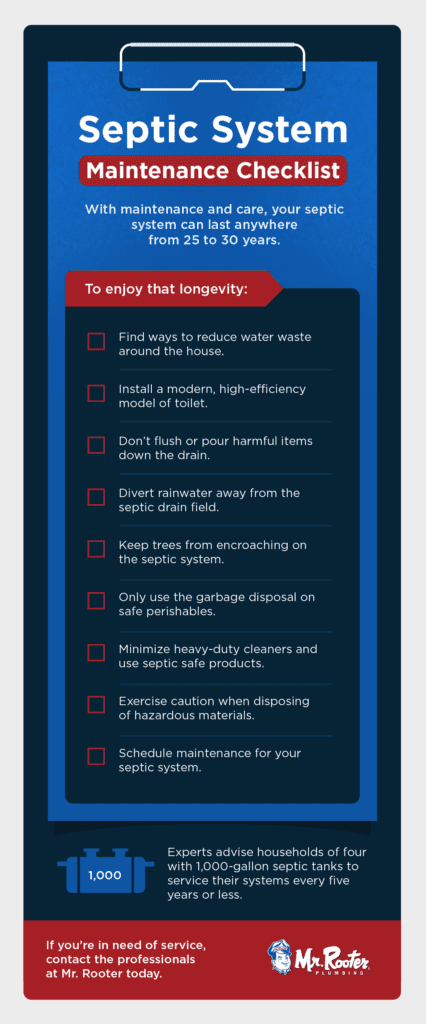
Recommended Cleaning Frequency
Determining the recommended cleaning frequency for your septic tank involves considering several factors. While general guidelines can provide a starting point, it is essential to adapt them to your specific situation.
General guidelines for cleaning frequency
As mentioned earlier, a 1,000-gallon septic tank serving 2-3 people should typically be cleaned every 3-5 years. However, the recommended frequency may vary based on the factors discussed earlier.
For example, a larger household with more occupants may require cleaning every 2-3 years, while a smaller household with fewer people may be able to extend the cleaning interval to every 5-7 years. Larger septic tanks can also generally go longer between cleanings compared to smaller tanks.
Factors to consider for specific situations
In addition to the number of occupants and the tank size, several other factors may influence the recommended cleaning frequency for your septic tank. These factors include:
-
Water usage: If your household consumes a significant amount of water, it may increase the frequency at which your septic tank fills up. Activities such as large laundry loads, excessive showering, or frequent dishwashing contribute to higher water usage.
-
Garbage disposal: Using a garbage disposal can increase the solid waste content in your septic tank. The more solid waste present, the faster the tank will fill up. If you use a garbage disposal regularly, it may be necessary to increase your cleaning frequency.
-
Chemical usage: Certain household cleaners, such as bleach or antibacterial soaps, can disrupt the natural bacteria balance in your septic tank. This disruption can hinder the breakdown of solids and require more frequent cleanings.
Consulting with a professional septic tank cleaner will help you assess these factors and determine the optimal cleaning frequency for your specific situation.
Hiring a Professional Septic Tank Cleaner
While some homeowners may attempt to clean their septic tanks themselves, it is generally recommended to hire a professional for this task. Here’s why:
Why hire a professional?
-
Expertise and equipment: Professional septic tank cleaners have the necessary knowledge, expertise, and specialized equipment to effectively clean and pump septic tanks. They are familiar with the intricacies of septic systems and can ensure that the job is done correctly.
-
Safety considerations: Cleaning a septic tank can be a hazardous task, as it involves working in confined spaces and handling potentially hazardous materials. Professional cleaners are trained to adhere to safety protocols and have the necessary protective gear to carry out the job safely.
-
Proper disposal: Septic tank waste must be properly disposed of according to local regulations. Professionals are well-versed in these regulations and will ensure that the waste is disposed of in an environmentally responsible manner.
What to look for in a septic tank cleaner
When hiring a professional septic tank cleaner, it is essential to consider the following factors:
-
Licensing and certification: Ensure that the cleaner is licensed and certified to perform septic tank cleaning. This ensures that they have undergone the necessary training and meet industry standards.
-
Experience: Look for a cleaner with a proven track record and extensive experience in the field. An experienced cleaner is more likely to provide a reliable service and offer valuable advice on septic system maintenance.
-
Customer reviews: Read reviews and testimonials from previous customers to get a sense of the cleaner’s reputation and the quality of their service.
-
Pricing: While pricing should not be the sole determining factor, it is important to compare prices from different cleaners to ensure you are getting a fair deal.
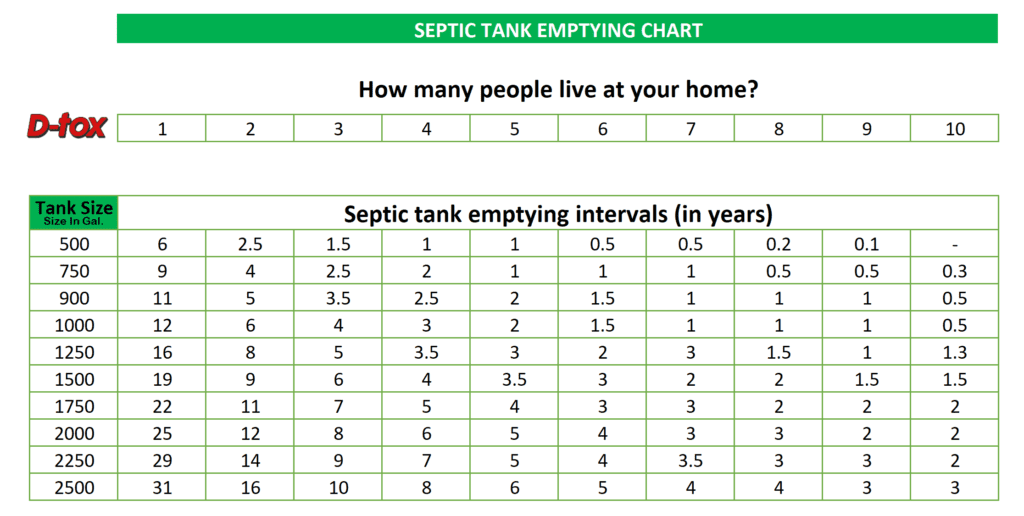
DIY Septic Tank Cleaning Tips
While hiring a professional cleaner is recommended, there are certain situations where a homeowner may choose to clean their septic tank themselves. If you decide to take on this task, it is crucial to follow these safety precautions and guidelines:
Safety precautions
-
Ventilate the area: Before entering the septic tank, ensure that there is proper ventilation to prevent the buildup of toxic gases. Use fans or natural air circulation to create a draft in the area.
-
Wear appropriate gear: Protective clothing, gloves, and a respirator should be worn to protect against exposure to hazardous materials and fumes.
-
Take breaks: Working in a confined space for an extended period can be physically demanding. Take regular breaks to prevent fatigue and ensure your safety.
Step-by-step guide for cleaning your septic tank
-
Locate and expose the septic tank: Locate the access point to your septic tank in your yard and use a shovel to dig down and expose the lid. Be cautious of any buried utility lines or other obstructions.
-
Remove the lid: Carefully remove the septic tank lid, ensuring that it is placed in a safe area away from the tank.
-
Pump out the solids: Use a vacuum truck or a powerful pump to remove the solids and sludge from the tank. This should be done by a professional if you are not experienced in using such equipment.
-
Inspect the tank: Take the opportunity to visually inspect the tank for any signs of damage or leaks. Pay attention to the inlet and outlet baffles and ensure they are in good condition.
-
Replace the lid: After the tank has been pumped and inspected, securely replace the lid, ensuring a tight seal. This will prevent any odor or gas from escaping.
-
Proper waste disposal: If you choose to clean the tank yourself, make sure to dispose of the waste in compliance with local regulations. Contact your local waste management authority for guidance on proper disposal methods.
-
Keep records: Maintain a record of when the cleaning was performed and any other relevant information, such as the volume of solids removed. This record will help you track the cleaning frequency and identify any patterns or issues.
Consequences of Neglecting Septic Tank Maintenance
Neglecting the regular maintenance of your septic tank can have severe consequences, both for your septic system and your overall property. Here are some potential effects of neglecting septic tank maintenance:
Effects on overall septic system health
-
System failure: A neglected septic tank is more likely to experience system failure, resulting in wastewater backup into your home or yard. This can be a health hazard and cause significant property damage.
-
Drainfield problems: If the septic tank is not adequately maintained, solids can flow into the drainfield and clog the pipes. This can result in slow drainage, pooling water, and foul odors in your yard.
Potential costs and repairs
-
Expensive repairs: Repairing a failed septic system can be expensive, especially if significant damage has occurred. This includes repairing or replacing drainfield pipes, adding additional absorption fields, or even replacing the entire septic system.
-
Property devaluation: Neglected septic systems can affect the value of your property. Prospective buyers may be wary of purchasing a property with a poorly maintained septic system, potentially leading to a lower selling price or difficulties in selling the property altogether.
It is crucial to prioritize regular maintenance to avoid these potential consequences and ensure the long-term health and value of your property.
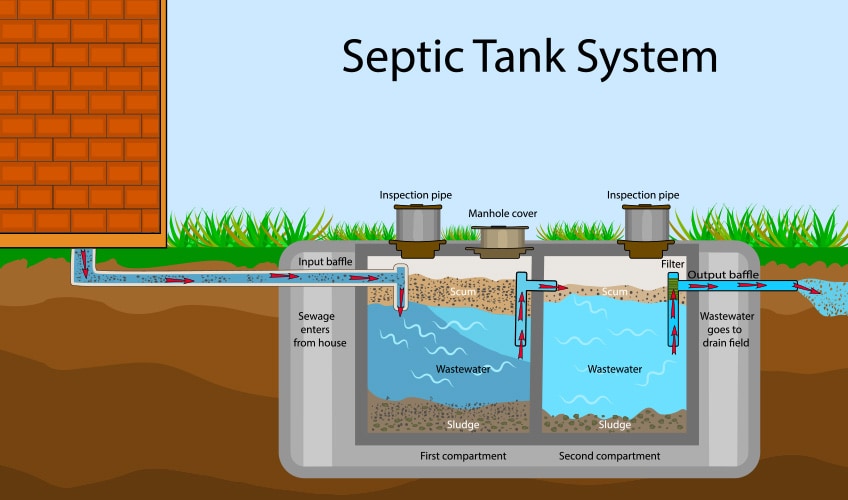
Alternative Septic System Options
In some cases, homeowners may choose to explore alternative septic system options that can offer additional benefits or address specific needs. Here are some types of alternative systems you may consider:
Types of alternative systems
-
Aerobic treatment units (ATUs): ATUs use mechanical processes, oxygenation, and bacteria to treat wastewater more effectively than traditional septic tanks. They are especially useful in areas with poor soil quality or high water tables.
-
Sand filter systems: These systems use sand or a combination of sand and other media to filter and treat the effluent before it is discharged into the drainfield. Sand filter systems are known for their superior treatment capabilities and can be an effective alternative in certain situations.
-
Constructed wetlands: Wetland systems mimic the natural processes of wetlands to treat wastewater. They are aesthetically pleasing and can provide additional landscaping benefits.
Pros and cons of alternative systems
While alternative septic systems can offer certain advantages, it is essential to consider their pros and cons before making a decision:
-
Advantages:
- Improved treatment capabilities: Alternative systems often provide more efficient and thorough treatment of wastewater.
- Flexibility in installation: Some alternative systems can be installed in areas where traditional septic systems are not feasible.
- Environmental benefits: Certain alternative systems can have a smaller environmental footprint or be more compatible with sensitive ecosystems.
-
Considerations:
- Higher cost: Alternative septic systems tend to be more expensive to install and maintain compared to traditional septic tanks.
- Specialized maintenance: Some alternative systems require specialized maintenance and may not have as many service providers available.
- Local regulations: Ensure that alternative systems are permitted and compliant with local regulations before considering installation.
Consulting with a professional in the field can help you determine whether an alternative septic system is a suitable option for your property.
Conclusion
Regular septic tank cleaning and maintenance are crucial for the proper functioning of your septic system. By understanding how your septic tank works and recognizing the signs that it needs cleaning, you can take proactive measures to prevent system failure and costly repairs. Following essential maintenance guidelines, hiring a professional when necessary, and considering alternative septic system options can help you maintain a healthy septic system and protect the environment. As a responsible homeowner, it is your responsibility to prioritize septic tank maintenance, ensuring the long-term health and value of your property.
